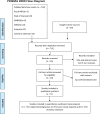Prevalence and associated factors of post-partum depression in Ethiopia. A systematic review and meta-analysis
- PMID: 33606768
- PMCID: PMC7894900
- DOI: 10.1371/journal.pone.0247005
Prevalence and associated factors of post-partum depression in Ethiopia. A systematic review and meta-analysis
Abstract
Background: Globally, post-partum depression is a major public health problem and is associated with a harmful effect on the infant, child, and mothers' mental, physical, and social health. Although a few post-partum depression studies have been published, we still lack an accurate estimated pooled prevalence of national PPD and associated factors.
Objectives: This study aims to show the estimated pooled prevalence of PPD and associated factors in Ethiopia.
Methods: We conduct the extensive search of articles as indicated in the guideline (PRISMA), reporting systematic review and meta-analysis. Databases like MEDLINE, PubMed, psych INFO, Web of Science, EMBASE, CINAHL, Scopus, and The Cochrane Library. All publications and grey literature were addressed by using MeSH terms and keywords. The pooled estimated effect of post-partum depression and associated factors was analyzed using the random effect model meta-analysis, and 95% CI was also considered.
Protocol and registration: PROSPERO 2020 CRD42020176769 Available from https://www.crd.york.ac.uk/prospero/display_record.php?ID=CRD42020176769.
Result: A total of 11 studies with 7,582 participants were included in this meta-analysis. The estimated pooled prevalence of post-partum depression (PPD) was 22.08%, with a 95% CI (17.66%, 26.49). For factors associated with post-partum depression, a random effect size model was used during meta-analysis; unplanned pregnancy [(OR = 2.84; 95% CI (2.04, 3.97)], domestic violence [OR = 3.14; 95% CI (2.59, 3.80)], and poor social support [OR = 3.57;95% CI (2.29,5.54) were positively associated factors with post-partum depression.
Conclusion and recommendation: The estimated pooled prevalence of post-partum depression was high in Ethiopia. Unplanned pregnancy, poor social support, and domestic violence were factors affecting PPD. Therefore, the Ethiopian policymakers and health personnel better give more emphasis to mothers who had a history of unplanned pregnancy, domestic violence, and poor social support.
Conflict of interest statement
The authors have declared that no competing interests exist.
Figures








Similar articles
-
Magnitude of postpartum hemorrhage and its associated factors in Ethiopia: a systematic review and meta-analysis.Reprod Health. 2022 Mar 9;19(1):63. doi: 10.1186/s12978-022-01360-7. Reprod Health. 2022. PMID: 35264188 Free PMC article.
-
The epidemiology of postnatal depression in Ethiopia: a systematic review and meta-analysis.Reprod Health. 2020 Nov 19;17(1):180. doi: 10.1186/s12978-020-01035-1. Reprod Health. 2020. PMID: 33213434 Free PMC article.
-
Exploring paternal postpartum depression and contributing factors in Ethiopia: a systematic review and meta-analysis.BMC Psychiatry. 2024 Oct 30;24(1):754. doi: 10.1186/s12888-024-06206-z. BMC Psychiatry. 2024. PMID: 39478469 Free PMC article.
-
Postpartum depression and its association with intimate partner violence and inadequate social support in Ethiopia: a systematic review and meta-analysis.J Affect Disord. 2021 Jan 15;279:737-748. doi: 10.1016/j.jad.2020.11.053. Epub 2020 Nov 12. J Affect Disord. 2021. PMID: 33234282
-
Prevalence of stress and associated factors among students in Ethiopia: a systematic review and meta-analysis.Front Public Health. 2025 Feb 17;13:1518851. doi: 10.3389/fpubh.2025.1518851. eCollection 2025. Front Public Health. 2025. PMID: 40034176 Free PMC article.
Cited by
-
Social support as a coping resource for psychosocial conditions in postpartum period: a systematic review and logic framework.BMC Psychol. 2024 May 28;12(1):301. doi: 10.1186/s40359-024-01814-6. BMC Psychol. 2024. PMID: 38807228 Free PMC article.
-
Major depression among pregnant women attending a tertiary teaching hospital in Northern Uganda assessed using DSM-V criteria.BMC Pregnancy Childbirth. 2025 Apr 26;25(1):504. doi: 10.1186/s12884-025-07618-9. BMC Pregnancy Childbirth. 2025. PMID: 40287620 Free PMC article.
-
The feasibility and acceptability of implementing simplified cognitive behavioral therapy approaches to support postpartum mental health and address associated social and behavioral barriers to postpartum family planning in Amhara, Ethiopia: a qualitative study.BMC Womens Health. 2025 May 24;25(1):248. doi: 10.1186/s12905-025-03744-w. BMC Womens Health. 2025. PMID: 40410834 Free PMC article.
-
Postpartum depression and associated factors in Afar Region, northeast Ethiopia.Heliyon. 2023 Sep 6;9(9):e19914. doi: 10.1016/j.heliyon.2023.e19914. eCollection 2023 Sep. Heliyon. 2023. PMID: 37809513 Free PMC article.
-
Occurrence of postnatal depression and its risk factors in a rural area of northern India: A prospective cohort study.Indian J Psychiatry. 2025 Jul;67(7):693-699. doi: 10.4103/indianjpsychiatry_782_24. Epub 2025 Jul 15. Indian J Psychiatry. 2025. PMID: 40786222 Free PMC article.
References
-
- Robertson E, Celasun N, Stewart D. Maternal mental health & Child health and development. World health organization http://www who int/mental_health/prevention/suicide/mmh% 26chd_c hapter_1 pdf. 2008;5:2016.
-
- Moussavi S, Chatterji S, Verdes E, Tandon A, Patel V, Ustun B. Depression, chronic diseases, and decrements in health: results from the World Health Surveys. The Lancet. 2007;370(9590):851–8. - PubMed
-
- Wachs TD, Black MM, Engle PL. Maternal depression: a global threat to children’s health, development, and behavior and to human rights. Child Development Perspectives. 2009;3(1):51–9.
Publication types
MeSH terms
LinkOut - more resources
Full Text Sources
Other Literature Sources
Medical

